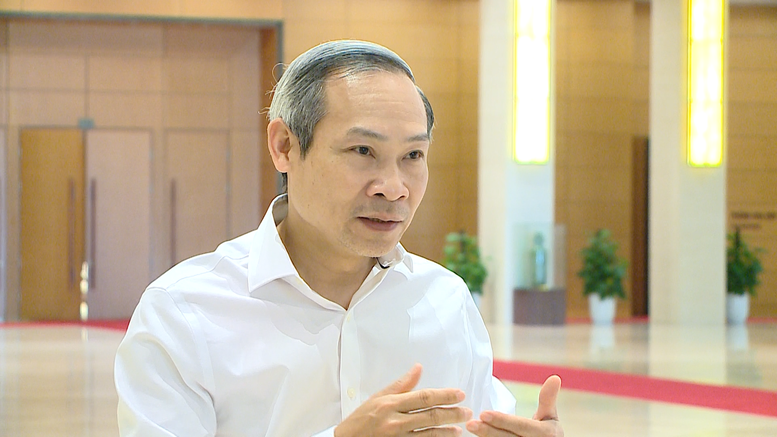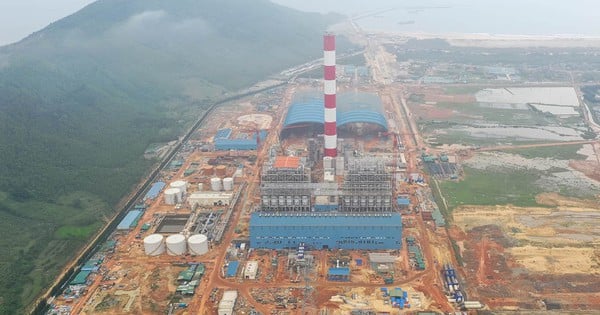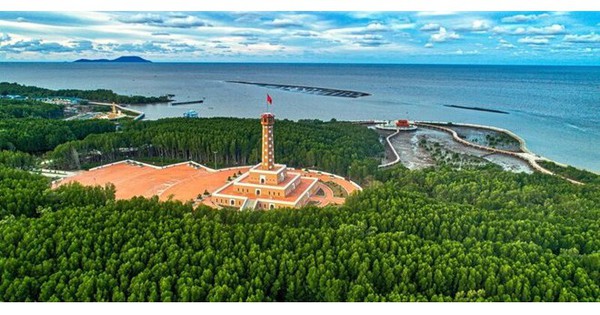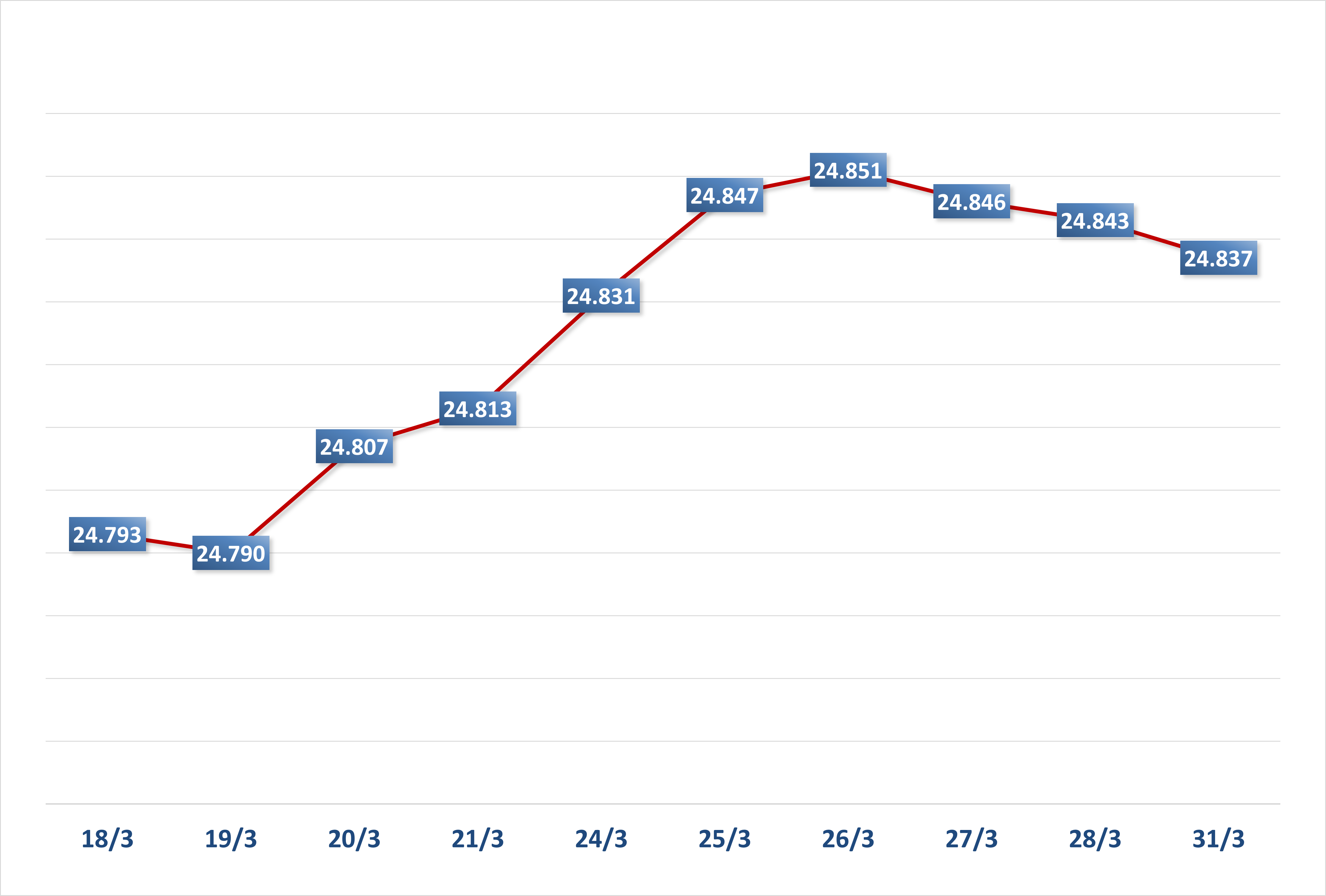
Mr. Phan Duc Hieu, Standing Member of the National Assembly's Economic Committee. Photo: VGP/Quang Thuong
The private economic sector is considered the leading important driving force for growth. How do you assess the development of this sector?
Mr. Phan Duc Hieu: First of all, the resolutions and policies of the Party and the State clearly identify the private economy (PE) as an important driving force in the country's economic development. For example, Resolution 10-NQ/TW and a number of action programs of the Government to implement this resolution; Resolution 45/NQ-CP,... all provide "indicators to measure" that the PE sector is an important driving force in the country's development. For example, we have indicators on quantity, quality,...
This is an opportunity for us to look back. We have had many solutions and policies in many different forms and ways. In addition to Resolution 10-NQ/TW, there have been specialized resolutions, Resolution 41-NQ/TW on building and promoting the role of entrepreneurs in the new era, specialized legal frameworks on attracting investment in areas such as agriculture, promoting innovation, etc.
Even the recent Resolution 57-NQ/TW aims at the policy framework and solutions to promote the private economic sector to apply science and technology, develop science and technology, improve innovation capacity, etc. In addition, we have the Law on Supporting Small and Medium Enterprises. The policy frameworks somewhere aim at the private economic sector. In a very broad aspect, a general aspect, a thematic aspect, we all have orientations and solutions to support the private economic sector.
However, the results of development, the contribution of the private economic sector, and the actual capacity of the private economic sector have not met expectations. I agree that in the current context, we need to rethink, calmly look at, and evaluate the entire reason why, despite so many solutions and measures, the private economic sector has not yet met our expectations and desires.
In this context, we really need a group of solutions. This group of solutions may not be completely new, inheriting what has existed before and is still suitable, but also needs to be refined, possibly from the implementation stage, the policy design stage. I hope we have more new solutions, truly breakthrough, suitable for the new context, new requirements for the development of the private economy so that this area can truly become an important driving force in economic development.
So, in your opinion, how should we orient the solution groups and focus on what major contents?
Mr. Phan Duc Hieu : First of all, I emphasize that the focus this time is still on new, breakthrough solutions, which must be unified in approach; solutions suitable for each different group of businesses.
For small and medium-sized enterprises, we must aim for a fair and favorable institutional environment, so that they have the opportunity to develop their capacity and be fair to medium and large-sized enterprises. For example, in the bidding regulations, if we do not define bidding without classifying according to the size of the enterprise, business opportunities will inadvertently fall on large enterprises. This deprives small and medium-sized enterprises of business opportunities. Meanwhile, reality proves that small and medium-sized enterprises are a very important and indispensable part of every economy. We aim for a fair institutional environment for all types of enterprises according to the size and nature of the business sector.
For groups of businesses with great development potential such as innovation, especially digital businesses with scale, the institution must be appropriate to create an environment for them to break through and develop quickly. For innovative businesses, if we keep applying a legal framework, an institutional framework like other businesses, it will sometimes become a hindrance. So the first approach, in my opinion, is to have an institutional framework designed to ensure the general nature of fairness, but it needs to have its own nature to promote, open up, and stimulate the specialized capacity of each different group of private economic sectors.
Regarding the group of institutional reform solutions, I think we will continue to implement the current solutions but at a higher level of reform. Previously, we talked a lot about eliminating and reducing barriers and administrative procedures. Now, we should raise it to another level, that is, even procedures that have not been identified as barriers but are not necessary, we can proactively abolish to increase space, freedom of business, and initiative in business of enterprises.
Next is the way to do it. I think we should learn from the precedent of the process of abolishing business conditions, assigning this task to a government agency, the Ministry of Justice, an independent agency such as establishing a working group. They proactively work and coordinate with relevant ministries and branches instead of assigning it to each ministry. This time, we should focus on abolishing unnecessary regulations and procedures. In the next phase, we should focus more on amendments.
At the same time, in improving institutions, it is necessary to emphasize redefining the role of the State. When we reduce controls on pre-inspection and licensing procedures, the role of the State is important in maintaining, like an arbitrator enforcing competition law, ensuring a fair, equal, transparent business environment, and resolving disputes in business operations of enterprises must be truly fast and effective.
For example, if a contract dispute is brought to court and resolved within 1-2 years, the prolonged case will cause damage to the business. In this case, in parallel with cutting regulations and procedural conditions, the role of the State in maintaining a competitive environment and the capacity of the judiciary must be enhanced.
What do you think about the viewpoint of "allowing private enterprises to do anything that is not prohibited by law", is this viewpoint actually fully implemented in the right spirit? Have the legitimate and legal rights of private enterprises been guaranteed as expected, sir?
Mr. Phan Duc Hieu: This will be the main viewpoint for the solution to develop the private economic sector in the new context that we are building. However, we should also learn from the experiences of related countries. On the one hand, we create a business environment and institutions based on the principle that enterprises have the right to freely conduct business, limit prohibitions and prohibitions, and promote the right to freedom of business. But those countries have superior models to institutionalize the right to freedom of business.
The experience is clear in the specialized free trade zones and economic zones, where they promote business freedom that I call 'absolute'. In the world, there are free economic zones with no taxes, even 30-year rent exemptions, or no licenses, free import and export, free production and business. There are economic zones and free trade zones dedicated to small and medium enterprises, dedicated to innovation activities because the nature of licensing in these zones must be different.
The infrastructure established by the state, innovation or testing of AI needs technological infrastructure and feasible policies for businesses. For example, testing self-driving cars, they cannot be allowed to drive themselves in the inner city. I think the breakthrough solution to institutionalize the main principle is the right to freedom of business. In addition to improving and changing the legal institutional framework in general, many free economic zones should be developed. I really hope that these are truly breakthrough policies for the private economic zone and can be specialized for many different groups of businesses, many different industries, and different scales./.
Minh Ngoc




![[Photo] 2nd Conference of the Party Executive Committee of Central Party Agencies](https://vstatic.vietnam.vn/vietnam/resource/IMAGE/2025/3/31/8f85b88962b34701ac511682b09b1e0d)

![[Photo] Ministry of Defense sees off relief forces to the airport to Myanmar for mission](https://vstatic.vietnam.vn/vietnam/resource/IMAGE/2025/3/30/245629fab9d644fd909ecd67f1749123)
![[Photo] Prime Minister Pham Minh Chinh receives delegation of leaders of US universities](https://vstatic.vietnam.vn/vietnam/resource/IMAGE/2025/3/31/8be7f6be90624512b385fd1690124eaa)



















































































![[REVIEW OCOP] An Lanh Huong Vet Yen Cat](https://vstatic.vietnam.vn/vietnam/resource/IMAGE/2025/3/27/c25032328e9a47be9991d5be7c0cad8c)



Comment (0)